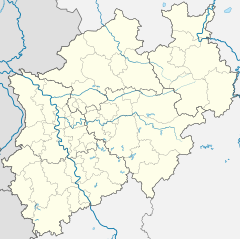Hattingen (Ruhr) station
| Through station | |||||||||||
 | |||||||||||
| General information | |||||||||||
| Location | Bahnhofstr. 79, Essen, North Rhine-Westphalia Germany | ||||||||||
| Coordinates | 51°24′02″N 7°10′10″E / 51.400639°N 7.169353°E | ||||||||||
| Owned by | DB Netz | ||||||||||
| Operated by | DB Station&Service | ||||||||||
| Line(s) | Ruhr Valley Railway (KBS 450.3) | ||||||||||
| Platforms | 1 | ||||||||||
| Train operators | DB Regio NRW | ||||||||||
| Connections | S3 | ||||||||||
| Other information | |||||||||||
| Station code | 2592[1] | ||||||||||
| DS100 code | EHAT[2] | ||||||||||
| IBNR | 8002639 | ||||||||||
| Category | 5[1] | ||||||||||
| Fare zone | VRR: 460[3] | ||||||||||
| Website | www.bahnhof.de | ||||||||||
| History | |||||||||||
| Opened | 15 February 1870[4] | ||||||||||
| Services | |||||||||||
| |||||||||||
| |||||||||||
Hattingen station is located in the town of Hattingen on the Ruhr river in the German state of North Rhine-Westphalia and is classified by Deutsche Bahn as a category 5 station.[1]
History
Construction of the station building started on 15 August 1868 and it was officially opened on 15 February 1870.[4] The building is constructed out of Ruhr sandstone with a three-storey tower on the entrance side. Like many monumental buildings of the Gründerzeit, it is based on the style of Karl Friedrich Schinkel.[5] The station is located on a section of the Ruhr Valley Railway opened on the 28 December 1869 by the Bergisch-Märkische Railway Company.[6]
Bahnhofsstraße connects the station, which is situated close to the Ruhr, with the town of Hattingen. At the end of the 19th century, this street was the axis of an extension of the town to the west. The former Henrichshütte steel works, founded in 1854, is a short distance up the river. Near the station is the former Birschel mill.
The end of mining in the region reduced the significance of the Ruhr Valley Railway. Regular passenger services in Hattingen ended on 30 November 1979. Even freight traffic no longer had much significance. On 20 May 1984, electrification of the line to Hattingen was completed and on 25 May 1985 the first electric train of the regional S-bahn network ran. The S-bahn uses only one platform, and it continues to a new underground terminus for the line in Hattingen-Mitte.
Hattingen station's main use now is as a stop on the heritage railway of the Bochum Dahlhausen Railway Museum.[5] The station building has been renovated as an inn.
Services

It is served by Rhine-Ruhr S-Bahn line S 3 every 30 minutes and two bus routes: 359 (operated every 30 minutes by BOGESTRA) and 558 (operated every 60 minutes by Verkehrsgesellschaft Ennepe-Ruhr).[7]
References
- ^ a b c "Stationspreisliste 2024" [Station price list 2024] (PDF) (in German). DB Station&Service. 24 April 2023. Retrieved 29 November 2023.
- ^ Eisenbahnatlas Deutschland (German railway atlas) (10 ed.). Schweers + Wall. 2017. ISBN 978-3-89494-146-8.
- ^ "Liniennetzplan/Wabenplan" (PDF). Bochum-Gelsenkirchener Straßenbahnen AG. April 2013. Retrieved 6 November 2019.
- ^ a b Joost, André. "Hattingen (Ruhr) operations". NRW Rail Archive (in German). Retrieved 13 May 2020.
- ^ a b "Bahnhof Hattingen". NRW Rail Archive (in German). The Industrial Heritage Trail. Retrieved 4 October 2011.
- ^ Joost, André. "Line 2400: Düsseldorf - Hagen". NRW Rail Archive (in German). Retrieved 13 May 2020.
- ^ Joost, André. "Hattingen (Ruhr) station". NRW Rail Archive (in German). Retrieved 13 May 2020.

